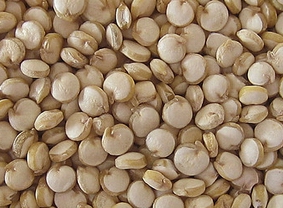 wn as the "gold of the Incas" or the "supergrain of the future", quinoa is a superfood with a plethora of health benefits. While quinoa is growing in popularity and becoming more well known throughout the world and in the United States, many still do not understand the unique and significant health benefits that come from eating quinoa.
wn as the "gold of the Incas" or the "supergrain of the future", quinoa is a superfood with a plethora of health benefits. While quinoa is growing in popularity and becoming more well known throughout the world and in the United States, many still do not understand the unique and significant health benefits that come from eating quinoa.Quinoa is a "pseudocereal" that is consumed similarly to cereal grasses like wheat, oats and rye but is technically a member of the food family along with beets, spinach and Swiss chard.
1. Quinoa is antioxidant rich.
Quinoa contains the antioxidant phytonutrients quercetin and kaempferol. Additionally, quinoa has a great deal of anti-inflammatory phytonutrients as well. This can promote tissue growth and aide in tissue repair as well as fight off disease and infection.
2. Quinoa is high in protein.
Unlike many other carbohydrates or grains, quinoa has a large amount of protein per serving. There is more lysine and isoleucine in quinoa, which makes it capable of serving as a complete protein source in our diets. This superfood contains all nine amino acids, making it a truly protein-rich food.
3. Quinoa is high in calcium.
Quinoa also has a great deal of calcium in comparison to other grains in the same category. For example, quinoa has twice the amount of calcium as whole wheat when you compare the two ounce for ounce.
4. Quinoa is high in fiber.
Fiber is an essential nutrient that regulates blood sugar levels and regulates your digestive system by preventing and relieving constipation. Quinoa contains twice as much fiber as almost every other grain. Diets high in fiber with foods like quinoa have been known to lower cholesterol and can help you loose weight in a healthy way. Unlike other grains in the category, quinoa has a low glycemic index because of its chemical makeup and the amount of fiber, making it a great carbohydrate choice for diabetics that won't raise your blood sugar.
5. Quinoa contains Riboflavin (B2).
Quinoa has a significant amount of Riboflavin which helps to stimulate your metabolism. Quinoa will regulate and promote energy production in your brain and muscle cells while increasing your metabolism. Riboflavin has also been shown to be a contributing factor to migraine relief.
6. Quinoa may reduce the risk of Type 2 Diabetes and heart disease.
Though not many studies have been conducted yet on the correlation between eating quinoa and lowering your risk for type 2 diabetes and cardiovascular disease, quinoa has a great deal in common with other foods that reduce these risks. Thus, it is likely that with quinoa's fiber, protein and antioxidant makeup, it would reduce the risk of these diseases.
Easily prepared and gluten free, quinoa can be incorporated into a number of recipes including salads, soups and side dishes. It is a power-packed food that will give you a lot of bang for your buck with its nutritional makeup. Quinoa, one of the world's healthiest foods, contains important antioxidant and anti-inflammatory properties, is rich in calcium, protein, fiber and Riboflavin and may reduce the risk of Type 2 Diabetes and heart disease, which truly makes it the grain of the future.





